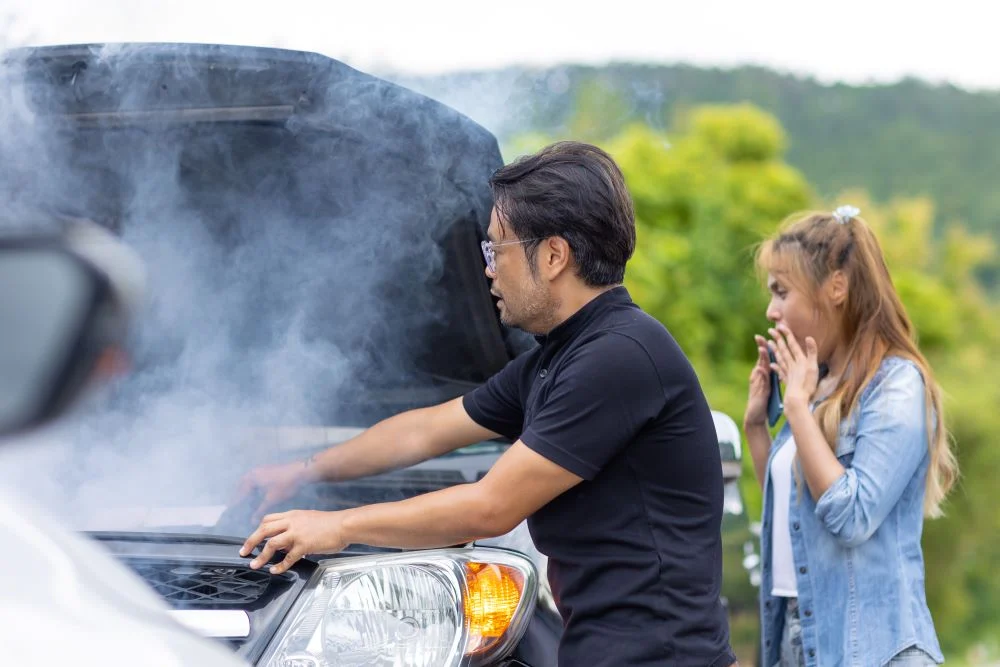You check the coolant. It’s full. But your car is overheating anyway. It’s frustrating and a little scary to see that temperature gauge climb. We know the stress when you are in such a situation. A full coolant tank doesn’t always mean your car’s cooling system is working right. There are more things to keep in mind as well. Let’s break down the top reasons your engine overheats even with full coolant and what you can do to keep your car cool.
Cooling System Problems
The cooling system of your car does more than just hold coolant. It moves it through the engine and radiator to keep the engine cool. And if parts inside the coolant system fail, your car’s engine can still overheat.
A car’s cooling system leak can be tricky. Sometimes it’s small enough not to drop coolant levels much, but it still lets air in. Air pockets can block coolant flow, trapping excess heat inside the car’s engine.
A failing thermostat or clogged radiator can also mess with coolant flow. Without steady movement, the engine coolant can’t absorb and carry away the excess heat.
If you’re thinking about warranty coverage while dealing with engine trouble, you might want to read How long does an automotive warranty last? It explains what’s covered and for how long.
Radiator Fan Trouble
The radiator fan of your automobile helps pull hot air away from the radiator. If it’s not spinning when it should, the engine temperature rises really fast.
It might be a faulty relay, a bad fan motor, or even a broken sensor that isn’t telling the fan to kick on. When that happens, you’ll see the temperature warning light or a climbing engine temperature gauge.
Even at highway speeds, a faulty radiator fan can prolong the overheated engine problem.
Water Pump Failure
The water pump is the heart of your car’s cooling system. How? Because it pushes the engine coolant through the radiator, engine, and hoses.
If the impeller blades of the pump are worn or the bearing fails, the coolant flow slows or stops. That leads to an overheating engine, even with a full coolant reservoir. You might also notice a coolant leak near the front of the engine if the pump’s seal is bad.
Radiator Cap Issues
A bad radiator cap can make the coolant system of your car act up. It’s not just a simple lid. It keeps the system under pressure so the engine coolant doesn’t boil. If it’s worn, loose, cracked, or the pressure drops. That can let hot air in and push coolant out, causing an overheated engine. Sometimes, all it takes is replacing the radiator cap to stop car overheating problems.
Blocked Heater Core
The heater core is part of the cooling system of your car. Coolant passes through it when you turn on the heat. If it’s clogged, it can slow down coolant flow. That can trap excess heat in the engine of your automobile and push the engine temperature above the normal operating temperature. You may also notice weak cabin heat or a sweet smell inside the car from a coolant leak.
Not sure how to choose coverage? Check out how to buy an extended car warranty – 2024 guide for tips before you commit.
Low Engine Oil
Engine oil does more than just lubricate. It also helps keep the engine cool by reducing friction. If the oil is too old or too low, friction builds up. That means excess heat inside the car’s engine, making the engine overheating problem worse.
Check your dipstick. Keeping fresh oil at the right level can prevent engine overheating and keep the engine in good condition.
Air in the Coolant System
Even with the coolant reservoir full, trapped air can block the flow of the coolant. Air pockets can form after a coolant leak, a repair, or even from a bad radiator cap.
When the coolant can’t move freely, the operating temperature rises. You’ll see the temperature gauge move past the normal operating temperature, and the car is overheating. Bleeding the coolant system removes trapped air and restores easy flow of the coolant.
Temperature Gauge or Sensor Problems
Sometimes, the engine temperature gauge or sensor lies. A faulty sensor can trigger the temperature warning light when the engine isn’t actually overheating.
But here’s the tricky part: a bad reading can also keep the radiator fan from turning on. That’s the real problem, because that means the engine temperature really will rise, and you’ll have an overheated engine for real.
And if you already have a plan in place, what steps should I take if I need to file a claim with my auto warranty provider? Will walk you through the process.
Hot Air Trapped in the Radiator
If hot air stays in the car’s radiator instead of venting out, the car’s cooling process slows down. That can happen if the radiator fan isn’t doing its job or if debris blocks the fins. Cleaning the radiator and checking airflow can help the engine cool quickly and stop car overheating-related issues.
Coolant Leak You Can’t See
Some leaks don’t leave puddles. Coolant can escape into the engine or might evaporate before hitting the ground. Even with the coolant reservoir topped up, the coolant system of your car won’t handle excess heat if it’s losing fluid inside.
Operating Temperature Climbing Too Fast
If the temperature of your car engine shoots up minutes after starting, something’s wrong.
- The water pump could be failing.
- The radiator fan might be dead.
- The thermostat could be stuck closed, blocking coolant flow.
Your vehicle’s cooling system should keep the engine temperature near the normal operating temperature once warmed up. If it can’t, you risk an overheated engine and severe damage.
How to Keep Your Car Cool
Keeping the engine of your car cool starts with watching the temperature gauge. If you see the temperature warning light or notice the car overheating, pull over immediately and safely.
- Check the coolant reservoir once the car engine is cool.
- Look for signs of a bad radiator cap, coolant leak, or worn water pump.
- Don’t ignore strange steam, smells, or excess heat from the hood.
Fresh engine oil, a clean radiator fan, and a working coolant system go a long way to prevent engine overheating. Address all the small issues before they turn into a major overheated engine repair.
Nova Warranty: Coverage for All Makes & Models
Call Nova Warranty today if you own a new or used car and want an extended auto warranty. We offer two auto protection plans, covering all makes and models.
Our coverage spans American-made vehicles such as Chevrolet, Tesla, Lincoln, Cadillac, Ford, Dodge, GMC, Buick, Chrysler, and Jeep, and European-made cars including BMW, Mercedes-Benz, Audi, Volkswagen, Volvo, and Porsche, and more.
We also include brands like Aston Martin, Jaguar, Land Rover, and Rolls-Royce, as well as Asian cars such as Acura, Subaru, Suzuki, Hyundai, Kia, and more.
Call us today and speak with our representatives about extended warranty options for whatever car you drive.






